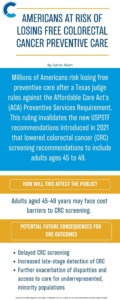Millions of Americans risk losing free preventive care after a Texas judge ruled against the Affordable Care Act’s (ACA) preventive services requirement. This could potentially derail the gradual uptick in screening rates among 45-49-year-old Americans–the age group that was recently asked to start screening for colorectal cancer (CRC).
ACA requires insurers to offer full coverage of preventive services upon recommendation of the U.S. Preventive Services Task Force (USPSTF), the Advisory Committee on Immunization Practices, or the Health Resources and Services Administration. This means that enrollees do not have to pay anything out of pocket for those preventive services. However, Texas federal judge Reed O’Connor ruled that the USPSTF is an independent panel of volunteers who are not officers of the U.S. government, and therefore, they are not qualified to determine which preventive services should be free.
The ruling applies explicitly to new and updated recommendations by the USPSTF since the ACA was established in March 2010. If it stands, additions and revisions to USPSTF recommendations made after March 2010 may be subject to out-of-pocket costs. These could include lung cancer screenings, medications to lower the risk of breast cancer for high-risk women, preexposure prophylaxis (PrEP) for HIV prevention, and statin use for heart disease prevention, among other recommendations.

ACA and Colorectal Cancer Screening
CRC is a leading cause of cancer-related deaths in the U.S., and its incidence among individuals younger than 50 is rising. For the longest time, average-risk adults were asked to start preventive screening for CRC at 50 years and continue till 74 years. In 2021, the USPSTF expanded its recommendation and lowered the screening age to include adults ages 45 to 49. It is this 45-49 age group that may potentially begin to face cost barriers to CRC screening if Judge O’Connor’s ruling stands.
The ruling does not immediately invalidate the complete coverage of preventive services under the ACA; however, millions will soon be required to pay for certain preventative care services, which could impact screening rates. Medically underserved communities that experience significant healthcare inequities, including access to preventive screening for CRC, could face additional barriers to CRC screening and disparities in CRC healthcare outcomes.
Sahar Alam is a Colorectal Cancer Prevention Intern with the Colon Cancer Foundation.

